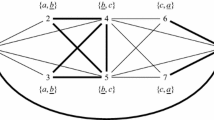Abstract
In 2-player non-zero-sum games, Nash equilibria capture the options for rational behavior if each player attempts to maximize her payoff. In contrast to classical game theory, we consider lexicographic objectives: first, each player tries to maximize her own payoff, and then, the player tries to minimize the opponent’s payoff. Such objectives arise naturally in the verification of systems with multiple components. There, instead of proving that each component satisfies its specification no matter how the other components behave, it often suffices to prove that each component satisfies its specification provided that the other components satisfy their specifications. We say that a Nash equilibrium is secure if it is an equilibrium with respect to the lexicographic objectives of both players. We prove that in graph games with Borel winning conditions, which include the games that arise in verification, there may be several Nash equilibria, but there is always a unique maximal payoff profile of a secure equilibrium. We show how this equilibrium can be computed in the case of ω-regular winning conditions, and we characterize the memory requirements of strategies that achieve the equilibrium.
This research was supported in part by the ONR grant N00014-02-1-0671, the AFOSR MURI grant F49620-00-1-0327, and the NSF grant CCR-0225610.
This is an extended version of the paper “Games with Secure Equilibria” that appeared in the proceedings of Logic in Computer Science (LICS), 2004.
Preview
Unable to display preview. Download preview PDF.
Similar content being viewed by others
References
Abadi, M., Lamport, L.: Conjoining specifications. ACM Transactions on Programming Languages and Systems 17, 507–534 (1995)
Alur, R., Henzinger, T.A.: Reactive modules. Formal Methods in System Design 15, 7–48 (1999)
Alur, R., Henzinger, T.A., Kupferman, O.: Alternating-time temporal logic. Journal of the ACM 49, 672–713 (2002)
Dziembowski, S., Jurdziński, M., Walukiewicz, I.: How much memory is needed to win infinite games? Logic in Computer Science (LICS), pp. 99–110. IEEE Computer Society Press, Los Alamitos (1997)
Emerson, E.A., Jutla, C.: The complexity of tree automata and logics of programs. In: Foundations of Computer Science (FOCS), pp. 328–337. IEEE Computer Society Press, Los Alamitos (1988)
Emerson, E.A., Jutla, C.: Tree automata, μ-calculus, and determinacy. In: Foundations of Computer Science(FOCS), pp. 368–377. IEEE Computer Society Press, Los Alamitos (1991)
Nash Jr., J.F.: Equilibrium points in n-person games. Proceedings of the National Academy of Sciences 36, 48–49 (1950)
Kechris, A.: Classical Descriptive Set Theory. Springer, Heidelberg (1995)
Kreps, D.M.: A Course in Microeconomic Theory. Princeton University Press, Princeton (1990)
Manna, Z., Pnueli, A.: The Temporal Logic of Reactive and Concurrent Systems: Specification. Springer, Heidelberg (1992)
Martin, D.A.: Borel determinacy. Annals of Mathematics 102, 363–371 (1975)
Martin, D.A.: The determinacy of Blackwell games. Journal of Symbolic Logic 63, 1565–1581 (1998)
Namjoshi, K., Amla, N., Emerson, E.A., Trefler, R.: Abstract patterns of compositional reasoning. In: Amadio, R.M., Lugiez, D. (eds.) CONCUR 2003. LNCS, vol. 2761, pp. 423–448. Springer, Heidelberg (2003)
Owen, G.: Game Theory. Academic Press, London (1995)
Pnueli, A., Rosner, R.: On the synthesis of a reactive module. In: Principles of Programming Languages (POPL), pp. 179–190. ACM Press, New York (1989)
Thomas, W.: On the synthesis of strategies in infinite games. In: Mayr, E.W., Puech, C. (eds.) STACS 1995. LNCS, vol. 900, pp. 1–13. Springer, Heidelberg (1995)
Thomas, W.: Languages, automata, and logic. In: Rozenberg, G., Salomaa, A. (eds.) Handbook of Formal Languages, vol. 3, pp. 389–455. Springer, Heidelberg (1997)
Author information
Authors and Affiliations
Editor information
Editors and Affiliations
Rights and permissions
Copyright information
© 2005 Springer-Verlag Berlin Heidelberg
About this paper
Cite this paper
Chatterjee, K., Henzinger, T.A., Jurdziński, M. (2005). Games with Secure Equilibria, . In: de Boer, F.S., Bonsangue, M.M., Graf, S., de Roever, WP. (eds) Formal Methods for Components and Objects. FMCO 2004. Lecture Notes in Computer Science, vol 3657. Springer, Berlin, Heidelberg. https://doi.org/10.1007/11561163_7
Download citation
DOI: https://doi.org/10.1007/11561163_7
Publisher Name: Springer, Berlin, Heidelberg
Print ISBN: 978-3-540-29131-2
Online ISBN: 978-3-540-31939-9
eBook Packages: Computer ScienceComputer Science (R0)




